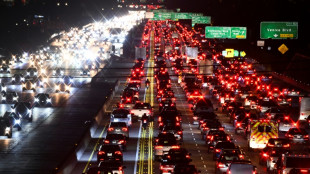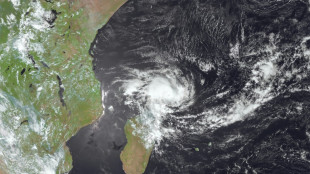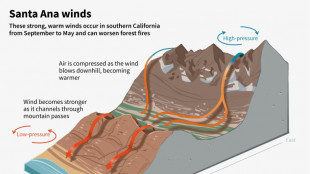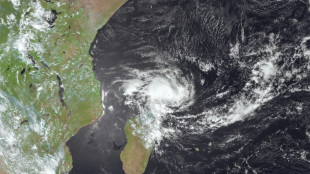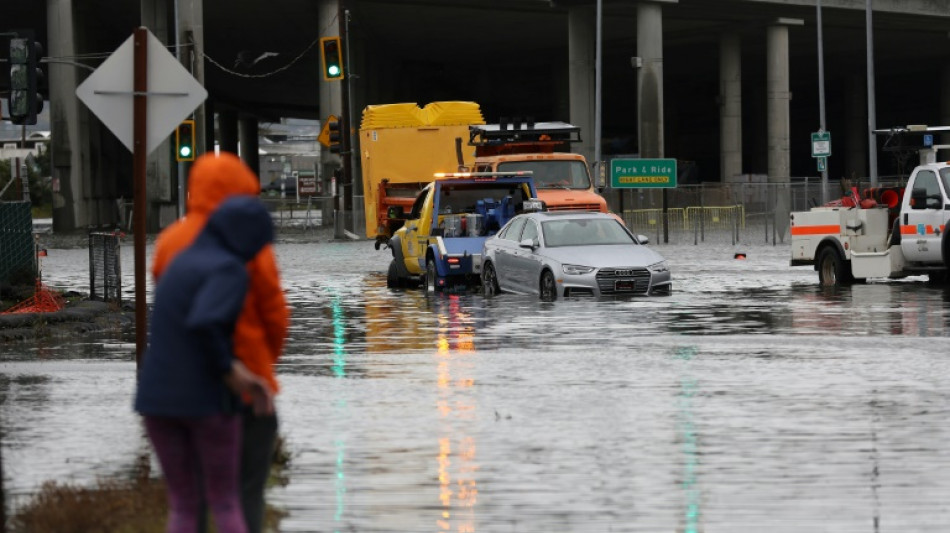

State of emergency declared in winter storm-battered California
Damaging winds, excessive rainfall and extremely heavy snow are expected to wallop California and southern Oregon through Thursday as a series of winter storms rip across the western US coast, prompting the Golden State's governor to declare an emergency.
The latest incoming system is expected to deliver another three to six inches of rain to already-saturated California, where the National Weather Service (NWS) is warning of coastal flash flooding and mudslides in wildfire-scarred terrain.
"Residents and visitors are urged to check their local forecast before traveling and prepare for potential power outages and/or flooding impacts," the NWS said.
Another drenching is expected in northern California by Friday night, leading to additional flooding concerns, the federal forecaster added.
The combination of a bomb cyclone -- a sudden steep drop in air pressure -- and atmospheric rivers -- where moisture-laden air is drawn in from the oceans -- have prompted mandatory evacuation orders in the most populous US state.
Governor Gavin Newsom declared a statewide emergency on Wednesday, while local authorities have issued ominous warnings of threats to life and property for a vast stretch of California, focused around San Francisco and Sacramento.
Bars and restaurants were shuttered in San Francisco as the city girded for Wednesday's storm, with local media showing flooded roads, and reports of long delays on public transport.
Dozens of flights were cancelled, some schools preemptively scrapped class and around 190,000 customers across the state were without power as of early Thursday morning, according to the PowerOutage.us website.
Thousands of sandbags were distributed to residents fearful of flooding.
"We're very worried about it," Deepak Srivastava told CBS in San Francisco.
"(I) just spent all day putting sandbags in front of the garage at every entering point and we're just crossing our fingers and hoping we won't have more damage."
City officials said they were working around the clock.
"We've been working very hard to source sandbags from wherever we can in northern California," said Rachel Gordon, of the city's public works department.
But she warned residents needed to take the storms seriously.
"If you don't have to be out in San Francisco, please don't be out on the roads."
- 'Several storms' -
The storms come after near-record rainfall was deposited over recent weeks.
On New Year's Eve, parts of northern California were lashed by a storm that caused landslides and power outages, as levees were breached and roadways were flooded.
At least one person is known to have died after being trapped in a submerged car.
San Francisco recorded almost 5.5 inches (14 centimeters) of rain on December 31, the city's second-wettest day in recorded history.
The waterlogging caused by those previous storms would exacerbate the danger of this one, meteorologist Matt Solum told AFP.
"This storm alone without the previous storms would cause localized flooding concerns and rock slides and mudslide concerns," he said.
"But with the recent wet conditions, a lot of the rainfall that's already fallen has already saturated the ground so any additional rainfall is going to run off instead of soak into the ground."
While it is difficult to draw a straight line to this storm from human-caused climate change, scientists say a warmer planet brings more unstable weather, with more ferocious storms as well as longer, hotter dry periods.
The western United States is in the grip of a decades-long drought, with below-average precipitation leaving river and reservoir levels worryingly low.
Solum said while any rain was helpful in alleviating the drought -- a long-term issue -- these back-to-back storms could be destructive because there was nowhere for the water to go.
"It's just the compounding impact of all the storms is what's going to be the most impactful," he said.
"Typically, we don't see this many series of storms with this much heavy rain."
And there is more to come.
"It's definitely going to continue," he said.
"We are expecting another one over the weekend. And then another several storms potentially for next week. And even possibly the following week as well."
Y.Byrne--NG
